 I just read the book High Performance Web Sites - which is an excellent
O'Reilly book about how to improve the performance of your website by
focusing on the frontend. This book gives 14 weighted rules to follow
that will improve the load time of your web page. Reducing the number
of HTTP requests, gzipping components, adding far-in-the-future expire
headers all lead to pages that load much faster.
I just read the book High Performance Web Sites - which is an excellent
O'Reilly book about how to improve the performance of your website by
focusing on the frontend. This book gives 14 weighted rules to follow
that will improve the load time of your web page. Reducing the number
of HTTP requests, gzipping components, adding far-in-the-future expire
headers all lead to pages that load much faster.
The author also describes a tool called YSlow that measures a number
of performance aspects of your page. It reports the total load time,
the page weight, a detail of component loading times, as well as an
overall score that indicates how well optimized a page is. A score of
A means that the website is doing all it can to eek out performance,
while a score of F means that there is plenty of room for improvement.
I applied this tool to 50 well known Music 2.0 sites and recorded the
front page load time, the YSlow score, the page weight (the amount of
data downloaded) and the total number of http requests needed to
download the page. As you can see from the table, Music 2.0 sites have
much room for improvement. The average load time for a Music 2.0 page
is 6.6 seconds, Ruckus was the worst with a load time of over 30
seconds. Ruckus also has the lowest YSlow score of 30, showing that
there are lots of things Ruckus can do to improve its page loading
time. According to YSLow, for starters, Ruckus could combine its 23
javascript files into one, saving 22 very expensive HTTP requests.
Note that flash-heavy sites like Musicovery, MusicLens appear to do
well here, but they've just shifted the loading times into a flash app
that is not measured by YSlow.
| name | load time
(secs) |
| score |
|
|
| Page
Weight (K) | HTTP
Requests
|
|---|
| Amazonmp3 | 4.722 |
| D (65) |
|
|
| 325.3 | 57
|
| Aol music | 7.6 |
| F (36) |
|
|
| 306.9 | 91
|
| All music guide | 12.013 |
| F (37) |
|
|
| 479.2 | 113
|
| Amie street | 3.291 |
| F (39) |
|
|
| 576.3 | 51
|
| Artistserver | 5.537 |
| F (44) |
|
|
| 173.3 | 39
|
| blogs.sun.com | 2.4 |
| F (58) |
|
|
| 103.3 | 22
|
| Cruxy | 3.491 |
| F (53) |
|
|
| 707.3 | 43
|
| Facebook | 6.45 |
| F (43) |
|
|
| 197 | 110
|
| Finetune | 10.6 |
| F (53) |
|
|
| 129.6 | 22
|
| Goombah | 5.269 |
| F (49) |
|
|
| 185.2 | 33
|
| Grabb.it | 3.398 |
| D (67) |
|
|
| 77.4 | 32
|
| Grooveshark | 2.303 |
| D (60) |
|
|
| 254.4 | 30
|
| Haystack | 5.796 |
| F (50) |
|
|
| 495.7 | 71
|
| iLike | 4.71 |
| D (62) |
|
|
| 190.8 | 24
|
| Lala | 5.548 |
| B (83) |
|
|
| 33.8K | 19
|
| Last.fm | 3.544 |
| C (71) |
|
|
| 408.3 | 59
|
| MP3 Realm | .802 |
| B (83) |
|
|
| 18.3k | 7
|
| Midomi | 29.872 |
| D (63) |
|
|
| 238 | 34
|
| Mog | 14.712 |
| B (80) |
|
|
| 293.3 | 53
|
| Mp3tunes | 10.886 |
| F (56) |
|
|
| 439.9 | 45
|
| MusicBrainz | 7.8 |
| F (44) |
|
|
| 369 | 35
|
| MusicIP | 1.517 |
| C (72) |
|
|
| 80.3 | 11
|
| MusicLens | .965 |
| A (96) |
|
|
| 5 | 2
|
| MusicMobs | 2.372 |
| D (62) |
|
|
| 161.4 | 31
|
| music.of.interest | 2.239 |
| C (79) |
|
|
| 105.2 | 7
|
| Musicovery | 1.315 |
| A (92) |
|
|
| 144.6 | 5
|
| MyStrands | 5.463 |
| F (55) |
|
|
| 222.5 | 33
|
| Napster | 3.876 |
| F (27) |
|
|
| 374.9 | 58
|
| OWL Multimedia | 3.963 |
| F (36) |
|
|
| 469.2 | 49
|
| OneLLama | 11.777 |
| F (40) |
|
|
| 341.4 | 59
|
| Pandora | 5.732 |
| D (63) |
|
|
| 957.5 | 17
|
| QLoud | 1.336 |
| F (52) |
|
|
| 206.7 | 38
|
| Radio Paradise | 2.445 |
| F (55) |
|
|
| 254 | 60
|
| Rate Your Music | 7.951 |
| C (71) |
|
|
| 634.9 | 71
|
| Rhapsody | 7.183 |
| F (31) |
|
|
| 782.1 | 121
|
| Ruckus | 34.039 |
| F (30) |
|
|
| 766.2 | 73
|
| Shoutcast | 2.452 |
| D (61) |
|
|
| 96.4 | 22
|
| Shazam | 10.442 |
| F (56) |
|
|
| 507.8 | 46
|
| Slacker | 16.803 |
| F (48) |
|
|
| 373.5 | 25
|
| Snapp Radio | 11.747 |
| C (78) |
|
|
| 38.6 | 8
|
| Snapp Radio2 | .986 |
| B (85) |
|
|
| 68.2 | 5
|
| Songbird | 5.636 |
| D (61) |
|
|
| 621.2 | 37
|
| Soundflavor | 7.879 |
| F (44) |
|
|
| 559.1 | 60
|
| Spiral Frog | 3.535 |
| F (46) |
|
|
| 407.6 | 90
|
| The Filter | 8.229 |
| F (37) |
|
|
| 710.3 | 61
|
| The Hype Machine | 6.395 |
| F (48) |
|
|
| 159.2 | 32
|
| Hype Machine(beta) | 3.92 |
| F (56) |
|
|
| 233.2 | 49
|
| Tune core | 5.945 |
| F (47) |
|
|
| 222.3 | 56
|
| Yahoo Music | 5.211 |
| F (55) |
|
|
| 481.6 | 35
|
| Youtube.com | 4.955 |
| D (65) |
|
|
| 204.2 | 65
|
| YottaMusic | 2.127 |
| C (76) |
|
|
| 51.3 | 42
|
| ZuKool Music | 4.046 |
| D (67) |
|
|
| 244.3 | 20 |
I've
also included SnappRadio (a mashup that I wrote a while back) along
with a rewrite (snappradio2) that uses the Google web toolkit. One of
the primary goals of the GWT is to make sure that your web app performs
well. This is evident, as the load time for my app went from a laggy 12
seconds to a snappy one second.
Looking at this data, it looks
like just about all of the music 2.0 sites could cut their page load
times in half with just a few simple techniques. Combining
javascript code into a single file, adding far-future expiration headers
to javascript and images - take little time to implement but can have
surprisingly large positive impact on performance.
I highly recommend the book along with the Yahoo's exceptional performance team's website. Both are filled with techniques and tools for improving web site performamnce.
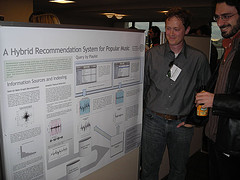
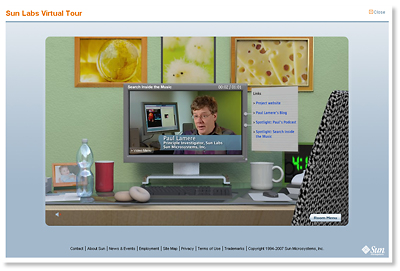
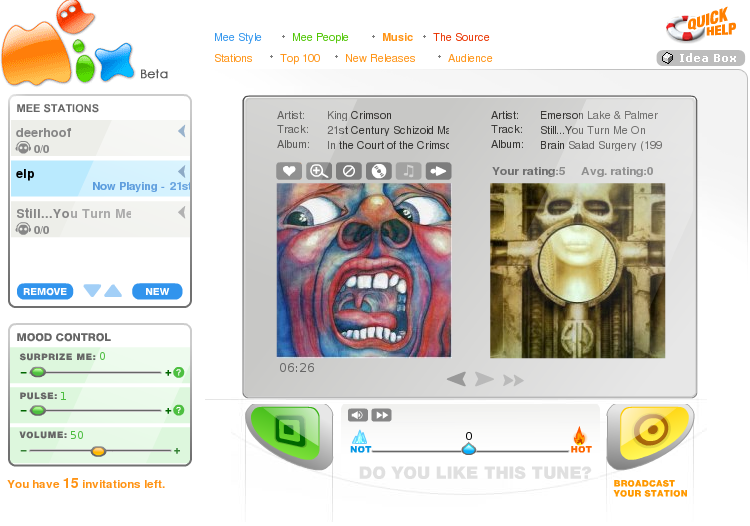

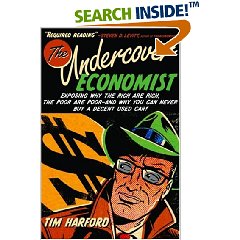
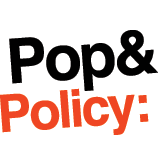 Yesterday, I sat on a panel at the Pop and Policy summit in Montreal.
The topic was music recommendation. I was joined by Brian Whitman
(founder of Echo Nest), Doug Eck (Machine Learning and music at
the University of Montreal), Diane Sammer (CEO of Goombah), and Sandy
Pearlman (MoodLogic, producer of The Clash, Blue Oyster
Cult). The panel was moderated by journalist Karla Starr (who
wrote an excellent piece on
Yesterday, I sat on a panel at the Pop and Policy summit in Montreal.
The topic was music recommendation. I was joined by Brian Whitman
(founder of Echo Nest), Doug Eck (Machine Learning and music at
the University of Montreal), Diane Sammer (CEO of Goombah), and Sandy
Pearlman (MoodLogic, producer of The Clash, Blue Oyster
Cult). The panel was moderated by journalist Karla Starr (who
wrote an excellent piece on